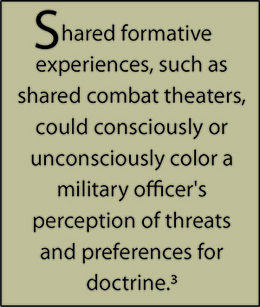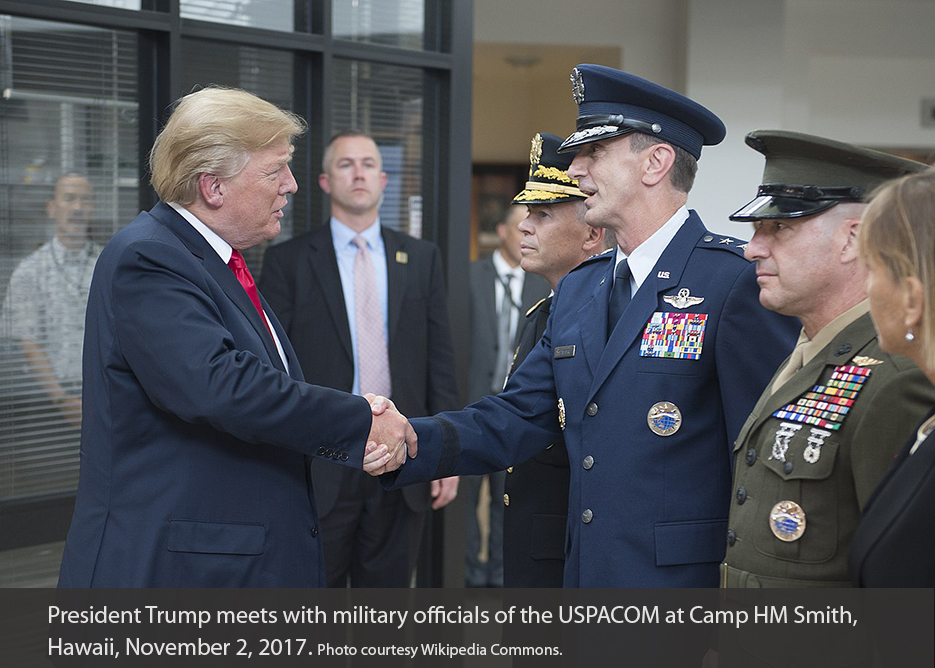Sara Plana, a PhD candidate in the Department of Political Science, discusses the civil-military relations under President Trump, referring to it as the ultimate Huntingtonian experiment.
In this new era of American politics, discussion of the civil-military relations of the Trump administration remains relatively absent from public discourse, relegated instead to a handful of specialists raising the alarm. The mainstream perspective on President Trump's treatment of the military highlights Trump’s penchant to venerate the troops and "his" generals while simultaneously praising those very military men for being the “adults in the room.” Given these proclivities, Trump-era civil-military relations deserves a more comprehensive scholarly diagnosis.
The Trump administration has exhibited at least four distinct civil-military patterns—relying on men in uniform for advice, receiving some notable pushback from active-duty and ex-military men, delegating military decision-making to the military, and relying on the military as the main tool of foreign policy. These behaviors raise red flags about the health of our foreign policy, security-making, military effectiveness, and democracy. In the subsequent sections, I leverage the political science literature on civil-military relations to explain if and why we should be worried.

Sara Plana is a PhD candidate in the Department of Political Science focusing on the balancing act between military effectiveness and abuse of power.
Appointing military men to civilian roles
Perhaps the most obvious pattern is Trump’s preference for military experience in his top political appointments. Since his inauguration, Trump has surrounded himself with a cabal of generals: he appointed ex-Marine General James Mattis for the position of Secretary of Defense, pegged ex-Marine general John Kelly to head the Department of Homeland Security before moving him closer to the White House as his Chief of Staff, and plucked active-duty Army general HR McMaster to be his National Security Advisor, replacing notorious ex-three-star Michael Flynn.
The concern regarding this cabal of generals that may be the most alarming (and most sensationalist) is the possibility of a coup, which is still quite unlikely, considering America’s robust norms of democratic civilian control. Instead, the real danger lies in the dominance of the military viewpoint to the detriment of other perspectives in crafting national security and domestic policy.
Numerous studies have posited how military experience can develop biases or worldviews that influence individuals’ recommendations and policy preferences. Most classically, civil-military relations as a line of study has long grappled with the concept of the “military mind.” The father of modern military thought, Carl Clausewitz, derived a set of qualities that most military men, who are exposed to the special circumstances of war, must have or develop out of necessity: a “military genius.”1 The famed Samuel Huntington similarly claimed that military professionals were likely to share preferences resulting from their profession, such as a preference for rigidity and conservativeness.2
More recent empirical work has outlined two main reasons why the overrepresentation of a military perspective in the top levels of the government should give us pause.

Shared formative experiences, such as shared combat theaters, could consciously or unconsciously color a military officer’s perception of threats and preferences for doctrine.3 As a hypothetical example, all three main appointees still in the government all came through the ranks roughly at the same time, and all deployed to Iraq, sharing experiences such as witnessing their fellow soldiers being violently targeted by Iranian-backed proxies. It would be understandable for these experiences to develop a firm bias against Iran; it would be difficult to believe that these men are not reminded of their personal experiences when contemplating what to recommend to Trump about priorities for military strategy in the Middle East. And indeed, a coalition has formed among Trump’s inner circle of (ex-) military men supporting a more hawkish stance towards Iran.4
Not only do these men share combat experiences, but they also share a lifetime of exposure to military organizational interests and biases. A well-established explanation for the start of World War I argues that many European militaries at the time had organizational interests in pursuing an offensive strategy, which led to a spiral of insecurity that only needed a spark to develop into the full conflagration that followed.5 Scholars have disputed whether military leaders are organizationally predisposed to prefer using force,6 but at the very least these works reveal how military assumptions and recommendations, when left unchallenged by alternative perspectives from civilian leaders,7 can sometimes lead to terrible outcomes.
Kelly’s movement from his predominantly security-oriented role as DHS Secretary to a position with a much broader political portfolio as Chief of Staff highlights another emerging danger: normalizing the military’s involvement in areas that are not usually within its professional purview. An ex-officer who has spent insufficient time as a civilian—like Kelly—may carry over cultural preferences specific to his military experience, which may be ill suited for civilian policymaking. Empowering such a man perpetuates a recent pattern in American politics wherein military leaders are entrusted with policymaking more so than civilian leaders.8 This evokes Harold Lasswell’s warnings at the beginning of the Cold War that a garrison state may be forming, in which the military is seen as the most dominant actor in society. In his seminal article in 1941, he argued that more dominance of military matters over economic and political life would sow the seeds of our own democracy’s peril.9
Resistance from active-duty and ex-military officers
Since the Trump administration took office, the press periodically fixates on instances in which current or former military officers challenge or outright contradict rhetoric from the White House or the President. For instance, in August, Mattis claimed the US military would still consider transgender candidates until his office finished his assessment on the issue, undermining Trump’s tweets announcing a ban on transgender service in the military.10 In another series of high profile examples, when asked about options to tackle the North Korea crisis, Mattis and the Chairman of the Joint Chiefs of Staff Joe Dunford have on numerous occasions claimed military options take a backseat to diplomacy, despite Trump’s multiple tweets and statements indicating otherwise.11
In the past, the appropriateness of openly ignoring or defying the president has been fiercely debated, from General Douglas MacArthur’s notorious obstinacy to the Revolt of the Generals in 2006, when retired generals coalesced and called for then-Secretary of Defense Rumsfeld’s resignation over the mishandling of the Iraq war. In this case, however, the dominant perspective of this behavior has been a positive one: most observers have acquiesced to or in some cases even praised such challenges.12
Both perspectives are misleading. It does not necessarily matter whether military officers resist or contradict their civilian leaders—which has happened to varying degrees in every administration—but rather in what ways and concerning which issues. Some scholars argue that resistance throughout the chain of command, either through appealing to the public or Congress or through more active defiance within the military bureaucracy, can undermine an administration’s strategic effectiveness by hampering the implementation of foreign policies that require a military arm.13 Others argue that too frequent resistance of any kind can undermine the professionalism of the military and, therefore, its own effectiveness in the long-term by normalizing challenges to civilian control of policymaking.14
However, despite occasional rhetorical opposition to presidential statements, there is no indication yet that these officers have actively resisted implementing an official policy—dampening the possibility that these concerns apply to the Trump case. In many ways, the situation is quite to the contrary: Mattis, Kelly, and McMaster have been paraded out to actively defend administration policies. In this way, the administration betrays another potentially dangerous habit: it borrows the legitimacy of the military to sell its political policies.
Delegating military decisions to the military
Trump’s habit of handing most security decision-making to the military is, in some ways, a welcome change. One of the main criticisms of the Obama administration was that it micro-managed security policy. Unlike Obama, Trump quickly allowed the military to manage and expand its drone strike program and opened up its rules of engagement in multiple theaters, without the same White House-level approvals that his predecessor required.15 However, experts still differ on which of the two approaches (military-dominant or civilian-dominant) best serves American security policy.
First, this loosening of the military’s reigns may give us pause for many of the same reasons that appointing military men to civilian positions in the administration should. So-called civilian supremacists from Clausewitz to Eliot Cohen argue that careful civilian oversight is necessary to connect military means with strategic aims, especially given the military’s aforementioned organizational and experience-based biases.
The Soldier and the State embodies the counter-argument: military supremacists (a term coined by Peter Feaver) from Huntington to Michael Desch believe that a country’s security policy would be best served by allowing the military, as a professional manager of violence, to formulate its own strategies.16 Indeed, they argue that undue civilian interference in military matters shortchanges military expertise and risks military ineffectiveness. This viewpoint has two major shortcomings. It falsely assumes that the line between what is political and what is military is clear in all cases. For example, the US’s recent counterinsurgency experiences in Iraq and Afghanistan—which rely on careful rules of engagement at a tactical level—illustrate the ways that seemingly purely military matters can affect strategic success. It also assumes, contrary to civilian supremacists, that the military will perceive these political aims correctly, ignoring the vast evidence that military men may be clouded by biases and organizational interests17 when crafting recommendations for how to implement a certain policy directive.
Regardless about where in this debate you land, Trump is running the ultimate Huntingtonian experiment and we may soon see whether we are indeed better off with a fully autonomous military.
Privileging military means
Time and again, Trump has shown a preference for military means in both foreign and domestic policy. From authorizing increased troop numbers in Afghanistan, Iraq, and Syria, to continued insistence on “military options” to counter North Korea, to the rumors of an increase in our nuclear arsenal, Trump has clearly shown an avid interest in the use of firepower over other foreign policy tools.18 Domestically, he reversed an Obama-era ban on military-grade weapons to the police.19
There are several drawbacks to a military-dominated governance style. First, leading with the pointy end may not always be the right strategy. In fact, a prominent school of thought in international relations argues that, under certain conditions, relying on aggressive signals can backfire, leading to a security dilemma between actors who by pursuing their own security can inadvertently threaten each other’s security.20 Trump’s preference for perpetually signaling aggression may create more enemies than it deters.
Second, the President’s dismissal of non-military means as illegitimate removes a key pillar of the US’s ability to secure itself and keep other actors in the world away from the brink of war. Trump’s disdain for diplomatic options—as manifested by his downsizing of the US foreign service and reduction of the State Department’s budget—will handicap US efforts to prevent crisis escalation. What effects are Trump’s statements dismissing diplomacy having on the probability of escalation in the standoff over North Korea? The next time India and Pakistan come close to the nuclear cliff, will the US be empowered to step in, mediate, and deftly deescalate as it has done many times before?
Which of these developments is the most worrying? The answer depends on the outcome you most care about: the health of our democracy, the strength of military professionalism, or the US’s security.
Trump’s civil-military relations challenges the health of our democracy in one important, underappreciated way: the highest echelons of decision-making are dominated by a single unelected viewpoint. Although civil-military scholars may still not agree on the exact nature of the cultural differences between civilians and the military, no one believes there is no difference. Therefore, the military monopoly over the formulation of foreign policy, security strategy, and even, on occasion, domestic policy could lead to patterns of policy output that do not match the popular will.
Observers who have previously sounded the alarm about military resistance to civilian directives can sleep easy, but worries about eroding military professionalism may persist given the administration’s habit of using military men as mouthpieces, exploiting a popular respect for the uniform for political gain.
Finally, and most worryingly, Trump’s civil-military style threatens US and global security in a few meaningful ways. The under-management of the military’s behavior can at the least put soldiers in danger for ill-defined or politically irrelevant goals and at the worst lead to strategic failures and a deterioration of US security. The administration’s penchant for military solutions most directly threatens the US’s ability to peacefully navigate crises that threaten it directly as well as the stability of the world.
1 Carl Clausewitz, On War (Princeton, N.J.: Princeton University Press, 1976), bk. 1.
2 Samuel P. Huntington, The Soldier and the State : The Theory and Politics of Civil-Military Relations, Caravelle Edition: V-514 (New York, NY: Vintage Books, 1964), 79.
3 Jack L. Snyder, The Ideology of the Offensive : Military Decision Making and the Disasters of 1914, Cornell Studies in Security Affairs (Ithaca [N.Y.] : Cornell University Press, 1984., 1984), 28–29.
4 “Gen. Kelly: We’re Working with Partners in the Middle East on Iran,” CNBC, October 12, 2017, https://www.cnbc.com/video/2017/10/12/gen-kelly-were-working-with-partners-in-the-middle-east-on-iran.html; Thomas Gibbons-Neff and David E. Sanger, “Mattis Contradicts Trump on Iran Deal Ahead of Crucial Deadline,” The New York Times, October 3, 2017, sec. Middle East, https://www.nytimes.com/2017/10/03/world/middleeast/mattis-iran-deal-trump.html.
5 Jack Snyder, “Civil-Military Relations and the Cult of the Offensive, 1914 and 1984,” International Security 9, no. 1 (1984): 108–46, https://doi.org/10.2307/2538637; Stephen Van Evera, “The Cult of the Offensive and the Origins of the First World War,” International Security 9, no. 1 (1984): 58–107, https://doi.org/10.2307/2538636.
6 Richard K. Betts, Soldiers, Statesmen, and Cold War Crises (Columbia University Press, 1977); Peter D. Feaver and Christopher Gelpi, Choosing Your Battles: American Civil-Military Relations and the Use of Force (Princeton University Press, 2005).
7 Loren DeJonge Schulman, “The Necessity of Questioning the Military,” The Atlantic, October 22, 2017, https://www.theatlantic.com/politics/archive/2017/10/necessity-of-questioning-military/543576/?utm_source=twb.
8 Jim Mattis and Kori Schake, Warriors and Citizens: American Views of Our Military (Hoover Press, 2016), chap. 1.
9 Harold D. Lasswell, “The Garrison State,” American Journal of Sociology 46, no. 4 (January 1, 1941): 455–68, https://doi.org/10.1086/218693.
10 “Statement by Secretary of Defense Jim Mattis on Military Service by Transgender Individuals,” U.S. DEPARTMENT OF DEFENSE, August 29, 2017, https://www.defense.gov/News/News-Releases/News-Release-View/Article/1294351/statement-by-secretary-of-defense-jim-mattis-on-military-service-by-transgender/.
11 Paul McLeary, “After Trump Speech, Mattis Says North Korea Crisis Still ‘Diplomatic Effort’ – Foreign Policy,” Foreign Policy, September 20, 2017, http://foreignpolicy.com/2017/09/20/after-trump-speech-mattis-says-north-korea-crisis-still-diplomatic-effort/; Alex Horton, “As Trump and North Korea Trade Threats, the Pentagon’s Top General Calls for Restraint,” The Washington Post, September 26, 2017, https://www.washingtonpost.com/news/checkpoint/wp/2017/09/26/despite-north-korean-threats-there-is-no-sign-its-military-is-readying-for-attack-general-says/?utm_term=.1591965b2c58; Nahal Toosi, “Dunford: Military Option for North Korea Not ‘Unimaginable,’” Politico, July 22, 2017, https://www.politico.com/story/2017/07/22/dunford-north-korea-military-option-not-unimaginable-240851.
12 Jonathan Capehart, “Why I’m Glad the Generals Are in Control in the Trump Administration,” The Washington Post, August 24, 2017, https://www.washingtonpost.com/blogs/post-partisan/wp/2017/08/24/why-im-glad-the-generals-are-in-control-in-the-trump-administration/?utm_term=.12e7abc11a1b; Robert Costa and Philip Rucker, “Military Leaders Consolidate Power in Trump Administration,” The Washington Post, August 22, 2017, https://www.washingtonpost.com/politics/military-leaders-consolidate-power-in-trump-administration/2017/08/22/db4f7bee-875e-11e7-a94f-3139abce39f5_story.html?tid=a_inl&utm_term=.27d86794ed0b.
13 Eliot A. Cohen, Supreme Command: Soldiers, Statesmen And Leadership In Wartime (Simon and Schuster, 2002).
14 Suzanne C. Nielsen and Don M. Snider, American Civil-Military Relations: The Soldier and the State in a New Era (JHU Press, 2009), chap. 11. For an alternative view, see H. R. McMaster, Dereliction of Duty: Johnson, McNamara, the Joint Chiefs of Staff (Harper Collins, 1998).
15 Charlie Savage and Eric Schmitt, “Trump Poised to Drop Some Limits on Drone Strikes and Commando Raids,” The New York Times, September 21, 2017, sec. Politics, https://www.nytimes.com/2017/09/21/us/politics/trump-drone-strikes-commando-raids-rules.html; Helene Cooper, “Trump Gives Military New Freedom. But With That Comes Danger.,” The New York Times, April 5, 2017, sec. Politics, https://www.nytimes.com/2017/04/05/us/politics/rules-of-engagement-military-force-mattis.html.
16 Peter D. Feaver, “The Right to Be Right: Civil-Military Relations and the Iraq Surge Decision,” International Security 35, no. 4 (March 18, 2011): 87–125, https://doi.org/10.1162/ISEC_a_00033; Michael C. Desch, “Bush and the Generals,” Foreign Affairs 86 (2007): 97–108; Richard K. Betts, Michael C. Desch, and Peter D. Feaver, “Correspondence: Civilians, Soldiers, and the Iraq Surge Decision,” International Security 36, no. 3 (Winter /2012 2011): 179–99.
17 Snyder, The Ideology of the Offensive; Snyder, “Civil-Military Relations and the Cult of the Offensive, 1914 and 1984”; Barry Posen, The Sources of Military Doctrine : France, Britain, and Germany between the World Wars, Cornell Studies in Security Affairs (Ithaca : Cornell University Press, 1984., 1984)
18 Trump Denies Seeking Nearly Tenfold Increase in U.S. Nuclear Arsenal,” Reuters, October 11, 2017, https://www.reuters.com/article/us-usa-trump-nuclear/trump-sought-dramatic-increase-in-u-s-nuclear-arsenal-nbc-idUSKBN1CG1UT; David Nakamura and Abby Phillip, “Trump Announces New Strategy for Afghanistan That Calls for a Troop Increase,” The Washington Post, August 21, 2017; “Trump Gives Pentagon Power to Reset Iraq, Syria Troop Limits,” Reuters, April 27, 2017, https://www.reuters.com/article/us-usa-trump-military/trump-gives-pentagon-power-to-reset-iraq-syria-troop-limits-idUSKBN17T03O.
19 Adam Goldman, “Trump Reverses Restrictions on Military Hardware for Police,” The New York Times, August 28, 2017, sec. Politics, https://www.nytimes.com/2017/08/28/us/politics/trump-police-military-surplus-equipment.html.
20 Robert Jervis, “Cooperation Under the Security Dilemma,” World Politics, 1978; Robert Jervis, Perception and Misperception in International Politics (Princeton University Press, 2017), 84–86.




